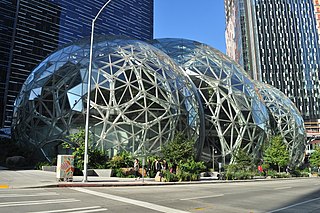
Amazon.com, Inc., is an American multinational conglomerate technology company based in Seattle, with 750,000 employees. It focuses on e-commerce, cloud computing, digital streaming, and artificial intelligence. It is considered one of the Big Four tech companies, along with Google, Apple, and Microsoft. It has been referred to as "one of the most influential economic and cultural forces in the world."
Rent control in the United States refers to laws or ordinances that set price controls on the rent of residential housing to function as a price ceiling.

A landlord is the owner of a house, apartment, condominium, land, or real estate which is rented or leased to an individual or business, who is called a tenant. When a juristic person is in this position, the term landlord is used. Other terms include lessor and owner. The term landlady may be used for female owners, and lessor may be used regardless of gender. The manager of a pub in the United Kingdom, strictly speaking a licensed victualler, is referred to as the landlord/lady.

Eviction is the removal of a tenant from rental property by the landlord. In some jurisdictions it may also involve the removal of persons from premises that were foreclosed by a mortgagee.

A lease is a contractual arrangement calling for the lessee (user) to pay the lessor (owner) for use of an asset. Property, buildings and vehicles are common assets that are leased. Industrial or business equipment is also leased.

A rent strike is a method of protest commonly employed against large landlords. In a rent strike, a group of tenants come together and agree to refuse to pay their rent en masse until a specific list of demands is met by the landlord. This can be a useful tactic of final resort for use against intransigent landlords, but carries the obvious risk of eviction and bad credit history in some cases.
A furlough is a temporary leave of employees due to special needs of a company or employer, which may be due to economic conditions at the specific employer or in the economy as a whole. These involuntary furloughs may be short or long term, and many of those affected may seek other temporary employment during that time.

The procedure and rate of eviction in the United States varies by locality. Landlord-initiated expulsion of tenants is not officially tracked or monitored by the Federal government, and has historically not been subject to comprehensive analysis. The 2016 publication of the book Evicted: Poverty and Profit in the American City by Matthew Desmond raised awareness of the issue. A database created by Desmond found that landlords had been granted eviction notices for one in 50 renter households in analyzed regions. This rate only counts evictions that engage the legal process, as many evictions are informally conducted between landlords and renters, it likely undercounts actual evictions.

The 2020 coronavirus pandemic in Singapore is part of the ongoing pandemic of coronavirus disease 2019 (COVID-19), a novel infectious disease caused by severe acute respiratory syndrome coronavirus 2 (SARS-CoV-2).

The ongoing pandemic of coronavirus disease 2019, a novel infectious disease caused by severe acute respiratory syndrome coronavirus 2, spread to the United States in January 2020. The first U.S. case was identified on January 20, in a man who had returned from Wuhan, China to Snohomish County, Washington on January 15. The first report of a U.S. death came on February 29. An earlier U.S. death, on February 6, was determined in late April, and is believed to be community transmission. By the end of March, cases had occurred in all 50 U.S. states, the District of Columbia, and all inhabited U.S. territories except American Samoa. By April 11, the federal government approved disaster declarations for all states and inhabited territories except American Samoa. As of April 24, the U.S. death rate was 152 per million people, the tenth highest rate globally.

The 2019–20 coronavirus pandemic was confirmed to have spread to Spain on 31 January 2020, when a German tourist tested positive for SARS-CoV-2 in La Gomera, Canary Islands. Post-hoc genetic analysis has shown that at least 15 strains of the virus were imported and community transmission had begun by mid-February. By 13 March, cases had been confirmed in all 50 provinces of the country.

The 2020 coronavirus pandemic in Trinidad and Tobago is part of the ongoing global viral pandemic of coronavirus disease 2019 (COVID-19), which was confirmed to have reached the Republic of Trinidad and Tobago on 12 March 2020.

COVID-19 was confirmed to have reached the U.S. state of North Carolina on March 3, 2020.
The 2020 coronavirus pandemic in British Columbia is an ongoing 2019–20 worldwide viral pandemic of coronavirus disease 2019 (COVID-19), a novel infectious disease caused by severe acute respiratory syndrome coronavirus 2 (SARS-CoV-2). On January 28, British Columbia became the second province to confirm a case of COVID-19 in Canada. The first case of infection was reported on January 28, where the patient had recently returned from Wuhan, Hubei province, China. The first case of community transmission in Canada was confirmed in British Columbia on March 5. As of April 28, 2020, the BC Centre for Disease Control has announced 2,053 confirmed cases, 1,231 recoveries, and 105 deaths. As of April 26, 2020, 78,805 people have been tested for the virus in British Columbia.

The 2019–20 coronavirus pandemic has affected educational systems worldwide, leading to the near-total closures of schools, universities and colleges.

The first COVID-19 case was confirmed in New York City in March 2020 in a woman who had recently traveled to New York City from Iran, a country seriously affected already by the 2020 coronavirus pandemic at the time. Nearly a month later, the metropolitan area was the worst-affected area in the country, with its medical infrastructure overtaxed.

The 2019–20 coronavirus pandemic affects the global food industry as governments close down restaurants and bars to slow the spread of the virus. Across the world, restaurants' daily traffic dropped precipitously compared to the same period in 2019. Closures of restaurants caused a ripple effect among related industries such as food production, liquor, wine, and beer production, food and beverage shipping, fishing, and farming.

The 2019–20 coronavirus pandemic has affected many science, space and technology institutions and government agencies worldwide, leading to reduced productivity on a number of fields and programs.

The worldwide disruption caused due to the 2019–20 coronavirus pandemic has resulted in numerous impacts on the environment and the climate. The severe decline in planned travel has caused many regions to experience a drop in air pollution. In China, lockdowns and other measures resulted in a 25 percent reduction in carbon emissions, which one Earth systems scientist estimated may have saved at least 77,000 lives over two months. However, the outbreak has also disrupted environmental diplomacy efforts, including causing the postponement of the 2020 United Nations Climate Change Conference, and the economic fallout from it is predicted to slow investment in green energy technologies.
This article is a summary of the social distancing measures related to the 2019-20 coronavirus pandemic.














